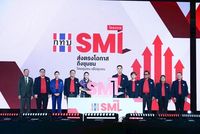On April 21, 2025, Prime Minister N.S.A. officially launched the SML project, aimed at injecting 11.39 billion baht into local communities across Thailand. This initiative, which stands for "Sending Opportunities Directly to Communities, By Communities, For Communities," seeks to empower grassroots participation in local governance and economic development.
The SML project has its roots in the early 2000s, initiated during the administration of former Prime Minister Thaksin Shinawatra. It was designed to address the pressing needs of local communities by allowing them direct access to funds for community-driven projects. Over the years, it has seen various iterations, notably during Yingluck Shinawatra's government in 2012, which further reinforced its objectives.
During the launch event, attended by key government officials including Deputy Prime Minister Prasit Chanthararuangthong and Minister Jiraporn Sindhuprai, Prime Minister N.S.A. emphasized the importance of strong communities as a foundation for national strength. "Today is an important day where we reaffirm that Thailand will move forward strongly. If communities are strong, the country will be strong too," she stated.
The initiative is designed to give local populations a say in how funds are utilized, with the aim of addressing specific community issues effectively. The Prime Minister pointed out that the government intends to decentralize power to local levels, allowing communities to identify their own needs and solutions. "It is crucial for citizens to have the right to participate in decision-making for their communities," she added.
According to Minister Jiraporn, the SML project began in 2004 under Thaksin's leadership, responding to a clear demand from citizens for budget allocations to tackle local problems directly. This grassroots approach is seen as a significant step towards enhancing democracy in Thailand.
As of 2025, the project has evolved into a robust mechanism with over 79,610 community funds in operation, serving more than 13 million members. Collectively, these funds boast a revolving capital of over 300 billion baht. The government plans to utilize these resources to stimulate local economies and create job opportunities.
"The goal is to fix all community issues and push to help the economy in all dimensions to a national level," said Prasit Chanthararuangthong, highlighting the ambitious scope of the initiative.
However, while the SML project aims to promote economic growth and empower local communities, it operates against a backdrop of a massive underground economy in Thailand, particularly in illegal gambling. A recent investigation revealed that illegal gambling operations generate an astonishing 1.1 trillion baht annually, creating a shadow economy that the government struggles to integrate into its fiscal framework.
The underground gambling industry is not only a significant source of revenue but also fosters a pervasive culture of corruption, with an estimated 80 billion baht in bribes exchanged annually. This money often evades taxation and regulation, raising questions about the government's ability to control and benefit from such a lucrative sector.
Analysts have pointed to "policy inertia" as a major obstacle in addressing these issues. This phenomenon refers to the government's reluctance to change existing systems, often due to the vested interests of those benefiting from the status quo. As one former high-ranking police officer noted, "The system is too complex to dismantle without removing the power of those who protect it."
Despite these challenges, the government remains committed to injecting funds into local economies, with the Village Fund projected to facilitate billions in circulation each year. The hope is that by empowering communities through the SML project, they can better address their own issues and contribute to the broader economic landscape.
In summary, the SML project represents a critical step in Thailand's approach to grassroots development, aiming to create a more participatory and empowered citizenry. However, the ongoing issues of corruption and the underground economy pose significant challenges that the government will need to confront as it seeks to fulfill its ambitious goals.


